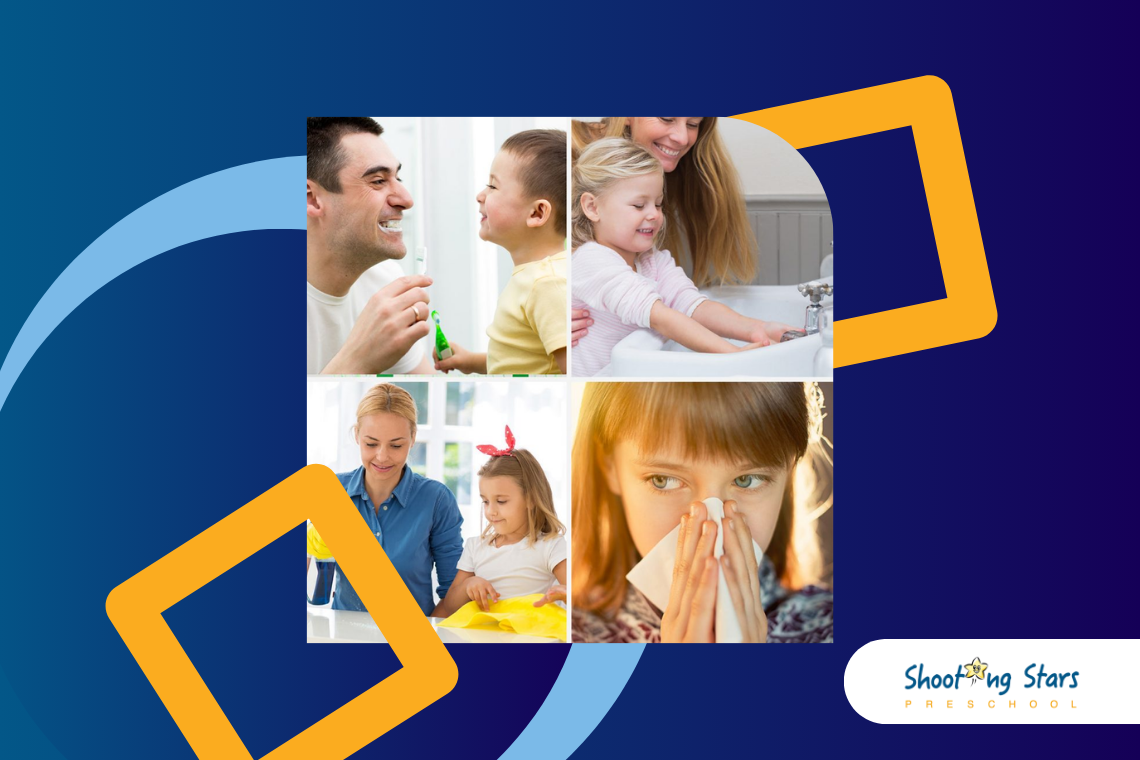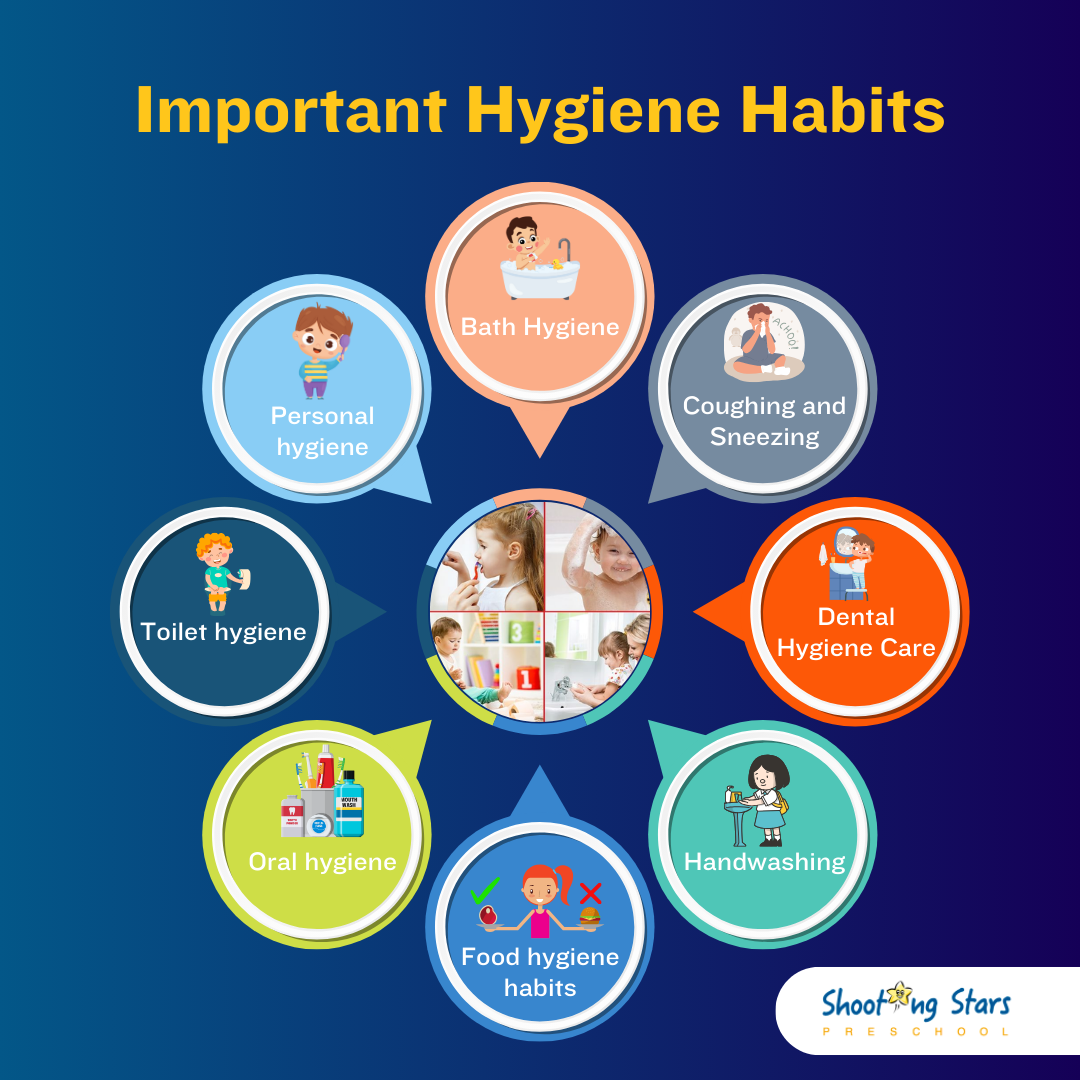|
Teaching kids healthy habits and hygiene practices is no longer a luxury; it is, indeed, a necessity that will groom them to grow up in the right way. Maintaining cleanliness is particularly important for grade-schoolers as they are intensely exposed to playful activities, outdoor games, and environmental pollution that would lead to sweat and skin problems.
This blog focuses on exploring and adopting important hygiene habits for kids, like maintaining cleanliness, washing hands, cleaning clothes, and many other hygiene habits.
Key Takeaways
Bath Hygiene
Bathing is one of the most important hygiene practices to maintain, irrespective of your age. Inculcating the habit of regular evening baths to your child is also one of the efficient parenting practices. Bathing twice a day can help your child stay hygienic and free from exposed environmental dust and toxins. It is a great way to relax internally and sleep well at night.
Kids can start bathing twice a day from the age of 6. Teaching kids the importance of bathing from kindergarten and following it twice a day can help them avoid body odor and other skin rashes. Let us discuss some bathing hygiene practices.
Bathing after play
Apply soap and make your kids wash and bathe properly after a good outdoor play. Proper baths can make a huge difference in avoiding skin rashes and maintaining body and personal hygiene.
Avoiding dirty clothes
Let your child avoid sweaty and dirty clothes. Wearing dirty clothes can easily promote the spreading of germs and lead to skin diseases.
Coughing and Sneezing
A sneeze can spread up to 100 miles per hour and can release 100000 germs into the air. As per research, sneezes can travel up to 200 times farther than originally presumed.
Usage of Tissues
The use of tissues while sneezing is an efficient yet easy way to get rid of germs and prevent the transmission of diseases through the air and viruses. Teaching children to use tissues to cover their noses during sneezing is a good way of maintaining sneezing hygiene.
Usage of hygienic handkerchiefs
Maintaining clean cloth or properly washed handkerchiefs to cover your nose while sneezing is also a good alternative to prevent sneezing unhygienic.
Dental Hygiene Care
Apparently, school-age children have enough motor skills to brush their teeth regularly on their own. Getting your child adapted to the habit of dental floss, brushing the tongue, insides of the cheeks, and the roof of the mouth is a must dental hygiene practice that is necessary to keep your kid's mouth clean and safe.
By practicing dental hygiene practices, your child can stay free and healthy from cavity problems and other serious teeth health problems. To keep your child excited about brushing regularly, you can use fun times or an hourglass filled with times.
Hand washing
Washing hands is a basic hygiene practice to follow. Washing your hands before and after every activity you perform is a great and easiest way to stay germ-free and maintain oily-free and dirty hands.
Adapting your kid to hand washing before and after eating food, playing outdoors, interacting with their peers, or touching unusual materials is a good way of maintaining body hygiene from a young age.
Food hygiene habits
Food hygiene habit is one such practice that cannot be avoided if you are willing to keep your child's health hygiene degree high. While teaching food hygiene habits, explain to your kid the importance of eating healthy over junk food. Let us discuss some important factors to consider for maintaining food hygiene.
Food containers
Maintain clean and washed food containers. Make a habit of washing food containers regularly. By maintaining clean containers, you can avoid food poisoning and the spread of germs.
Proper handwashing
Make sure your kid follows a full-fledged handwash by applying soap and washing every corner of the hands, which will prevent the germs and other bacteria from spreading. Make sure your kid is healthy.
Oral hygiene
Oral hygiene is one of the most essential factors to check, especially when for kids. Taking care of teeth and mouth is essential after every meal. Otherwise, there is a high chance of developing cavities and other oral diseases. Let us discuss the tips to follow for maintaining good oral hygiene in kids.
Brushing regularly
Make sure your kids brush regularly after every meal or at least twice a day, which will ensure clean and healthy teeth and avoid cavities and foul smells from the mouth.
Choosing right toothbrush
Choosing the right toothbrush is important if your kid is young and has just started brushing. Ensure to choose a kid's toothbrush that is harsh-free and soft for the kid's tooth.
Toilet hygiene
A bathroom is a place where maximum germs exist. As long as you keep the bathroom clean and neat, you can allow the child to use it. Let us discuss how to keep the bathroom clean.
Maintenance
Maintaining the washroom can avoid the spreading of germs and promote disease control. Adopt the habit of cleaning the bathroom thrice or four times a week.
Using bathroom fresheners
Use of bathroom fresheners can make your bathroom look neat and clean while maintaining a beautiful aroma.
Personal hygiene
Teaching personal hygiene to children requires patience. Let us discuss some important personal hygiene habits to teach your kids.
These are a few personal hygiene habits to consider for your child to maintain good health from an early age. Better hygiene habits in kids can lead to better growth while avoiding falling sick on a regular basis. Proper hygiene maintenance can build immunity and help them stay healthy.
Conclusion
So far, we have discussed many good hygiene habits to consider for your toddler. Maintaining personal hygiene is one of the good habits to inculcate in children. Occupying themselves with cleanliness and neatness can develop positivity while keeping their mental and physical health high.
Preschool in Dublin offers an array of programs for children that include physical activities, interesting teaching classes, and a fixed timetable to follow and maintain a healthy lifestyle from nursery.
FAQsWhat is the significance of teaching kids personal hygiene habits?
Teaching kids personal hygiene habits not only keeps them away from bad health but boosts their mental and physical health.
How do we teach hygiene habits to kids?
Make a proper schedule, assign hygiene habits as tasks, and make them interesting by offering gifts or surprising them.
At what age can kids start bathing twice a day?
You can make your child start bathing twice from the age of 6.
What are some easy personal hygiene practices to teach kids?
Some easy personal hygiene practices include washing hands before and after meals, wearing neat clothes, maintaining social distancing in public, and using washed food containers.
Comments are closed.
|



